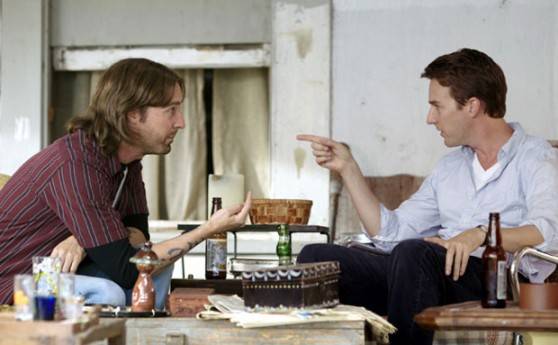 I’m obsessive about avoiding spoilers. If I’m watching a DVD, I fast-forward through previews. If I’m in a theater, and the film that’s being previewed is something I might want to see, I close my eyes while the trailer runs. I do this because, with the exception of The Blair Witch Project, trailers always give away too much of the story. I can’t stand it when a plot point about a film or book or television show is given away. So I walk into most things I see or read as a blank slate.
I’m obsessive about avoiding spoilers. If I’m watching a DVD, I fast-forward through previews. If I’m in a theater, and the film that’s being previewed is something I might want to see, I close my eyes while the trailer runs. I do this because, with the exception of The Blair Witch Project, trailers always give away too much of the story. I can’t stand it when a plot point about a film or book or television show is given away. So I walk into most things I see or read as a blank slate.
Thus, when I volunteered to review Tim Blake Nelson’s Leaves of Grass, I did so blindly. I not only knew nothing about this film, I’d never even heard of it. But I liked the title so I signed up for it, and I’m very glad I did. But I didn’t know that Edward Norton played a dual role. I didn’t expect the movie to be so funny, and because of that, when the violence happened, I really didn’t expect that. This film was a roller coaster of awesome, and it was the best I saw this year at Ebertfest.
Leaves of Grass opens with Bill Kincaid, a philosophy professor at Brown, lecturing his class on Plato’s The Symposium. His adoring students hang on his every word. Bill is a rising star in academics, even making the cover of (I believe) American Philosophical Quarterly. Harvard wants to hire him and students want to sleep with him. He’s young; he’s brilliant; he’s accomplished; he’s envied by his peers; he thinks he’s in charge of his life. And he prefers it that way.
Miles away, in Little Dixie, Oklahoma, lives Bill’s twin brother, Brady. When we meet Brady, he is — through a thick, southern drawl — eloquently explaining to three other drug dealers why he will never inject manipulated, manufactured, synthetic drugs into his “sweet self.” No, for Brady, only homegrown pot (preferably his own strain) will do. For it is the way God intended. His listeners hang on his every word. Brady is a horticulturalist. He’s a rising star in his county’s drug culture, and connected to the most powerful dealer in Tulsa. He’s young; he’s brilliant; he’s accomplished (in his way); he’s envied by his peers; he’s not in charge of anything. And he prefers it that way.
Leaves of Grass is a film about Fate, and I mean this in the classical sense of the word. Bill thinks he can control his own life if only he obeys the rules and keeps everything structured, like blank verse in a sonnet (he dislikes Whitman because he thinks that poems should have a prescribed meter). It is ironic that someone who studies and teaches the tragic fall of great heroes who are destroyed by their own hubris believes this, but like many academics, Bill doesn’t personalize his own scholarship. But when Brady intrudes on his safe, solitary life, Bill is forced to confront his convictions, his worldview, his own scholarship, and even academe itself.

Leaves of Grass is, indeed, a visually stunning film, but that won’t be all that delights viewers. Yes, the special effects that highlight Norton’s dual role as the twin brothers are wonderful, but it’s the quality of the acting, dialogue, and soundtrack that have stayed (and will continue to stay) with me. Norton’s brothers are indistinguishable from each other; Keri Russell recites difficult poetry convincingly; and both the soundtrack and score are absolutely perfect for setting the various moods, whether we’re at a wedding reception, riding through Louisiana’s scenic beauty, or witnessing a brutal murder. These are what make Leaves of Grass an astonishing achievement, and what led Roger Ebert to label it an “intelligent, philosophical and poetic film.”
During the discussion panel, Nelson told the audience that this film was created with the idea of “intended incoherence” in mind. He wanted his story to be about a philosopher who has the rug pulled out from under his life, but he also wanted the tale to include both comedy and tragedy. At the film’s end, says Nelson, Bill has transitioned from “sonnet to free verse.” If that isn’t creativity from the mind of an artist, I don’t know what is.

My one, small complaint is Susan Sarandon’s character, Daisy — Bill and Brady’s mother. Daisy was a free-spirited hippie, and treated her sons as if they were her friends rather than her children. Because of this, Bill has a lot of resentment toward her and I looked forward to their inevitable confrontation. I was disappointed with this scene, however. When Bill accuses Daisy (and all Baby Boomers, I imagine) of “tearing everything down,” but failing to build anything of substance to replace the destruction, Daisy just stands there and then petulantly says, “Well, as usual, you have all the answers.” Cop out. I happen to believe this about Baby Boomers myself, and Daisy’s response is pretty much all we ever seem to get out of them in these types of conversations. So maybe this scene isn’t a cop out. Maybe it’s realistic?
That tangent aside, I highly recommend, if you’ve not seen Leaves of Grass, that you please do so. You’ll be doing yourself a favor.
Crappy, blurry photo taken by me.
Movie stills from Ebertfest.com.
Please see Jamie Newell’s beautiful photos of Tim Blake Nelson here.








